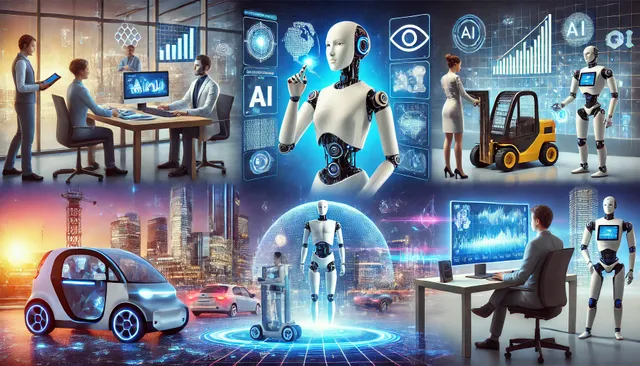🚀 The Professions Most Impacted by AI in the Near Future

Artificial intelligence (AI) 🤖 is radically transforming the job market 💼, causing profound changes in various sectors 🌐. As AI models evolve, tasks that were once exclusive to humans 👤 are being automated 🤖, creating both opportunities and challenges ⚖️. In this article, we will explore the professions that are likely to be most affected by AI in the near future and discuss how professionals can prepare for this new reality 🔄.
🔄 The AI Revolution in the Workplace
AI has established itself as a transformative force ✨, integrating into areas ranging from content creation 📝 to financial analysis 💰. With the ability to process large volumes of data 📊 and perform tasks autonomously 🤖, AI technologies are redefining processes and roles that were traditionally carried out by humans 👥. This technological revolution not only improves efficiency and productivity 🚀 but also raises concerns about job replacement ❗ and the need for professional reskilling 📚.
⭐ Key Professions
1. Customer Service 📞
The customer service sector is one of the most visibly affected by AI 🤖. Chatbots 💬 and virtual assistants are taking over repetitive tasks 🔁, providing 24/7 support ⏰ and quickly resolving basic inquiries ⚡.
Challenge: Professionals need to transition into supervisory roles 👀 and focus on solving complex problems 🧩, where the human touch remains irreplaceable ❤️.
2. Marketing and Communication 📢
AI tools are revolutionizing digital marketing 💻 by analyzing consumer data 📈 and creating personalized content 🎯. Automated advertising campaigns, advanced segmentation, and AI-generated content are just a few examples 💡.
Challenge: Marketing specialists must adapt, combining analytical skills 📊 with creative abilities 🎨 to interpret and act on AI-generated insights.
3. Software Development and IT 💻
In the technology sector, AI is accelerating software development by assisting with coding and debugging 👨💻. This automation speeds up the development process ⏩ but may reduce demand for routine tasks 🔄.
Challenge: IT professionals should focus on strategic and innovative aspects 🌟, specializing in areas that require creativity 🧠 and complex problem-solving.
4. Logistics and Transportation 🚚
Automation and AI are transforming logistics with the rise of autonomous vehicles 🚗 and smart fleet management systems 📦. These innovations promise increased efficiency 🏎️ and reduced operational costs 💸.
Challenge: Drivers and logistics operators will need to reskill 📘 for supervisory and maintenance roles in automated systems 🔧.
5. Finance and Data Analysis 💹
In the financial sector, AI algorithms are used for risk assessment ⚠️, fraud detection 🔍, and investment decision-making 📈. These systems can process data with impressive speed and accuracy 🚀.
Challenge: Financial professionals must develop skills in data analysis 📊 and algorithm interpretation to work collaboratively with automated systems 🤝.
6. Healthcare and Medicine 🏥
AI is being applied in healthcare to improve diagnostics 🩺, analyze medical images 📸, and personalize treatments 💊. These technologies enhance diagnostic accuracy and optimize clinical processes 📈.
Challenge: Doctors and healthcare professionals must integrate technology with empathy ❤️ and clinical decision-making 🧠 to ensure a human-centered approach 🤗.
🔮 Preparing for the Future
In light of this transformation, continuous adaptation is essential 📚. Investing in lifelong learning 🎓 and developing new skills can make all the difference for professionals who want to stay relevant 💡. Some key strategies include:
- Technical Enhancement: Courses in fields such as data science, programming 💻, and algorithm analysis are fundamental.
- Development of Soft Skills: Skills such as creativity 🎨, critical thinking 🤔, and effective communication 🗣️ will be increasingly valued.
- Reskilling and Continuous Learning: Attending workshops, training programs, and obtaining specialized certifications can help keep up with market changes 📈.
🌟 Final Thoughts
The AI revolution is irreversibly reshaping the professional landscape 🔄. While some roles may be automated 🤖, others will be redefined, and new opportunities will emerge 🚀. Success in the future job market will depend on professionals' ability to adapt, combining human skills with technological innovations 🤝. The synergy between human creativity and AI efficiency will be the key to driving innovation and maintaining competitiveness 💼.
This is a crucial moment to rethink education, training, and career development 📚. Stay informed, invest in knowledge, and be prepared for the challenges and opportunities that the new era of artificial intelligence brings 🔮.